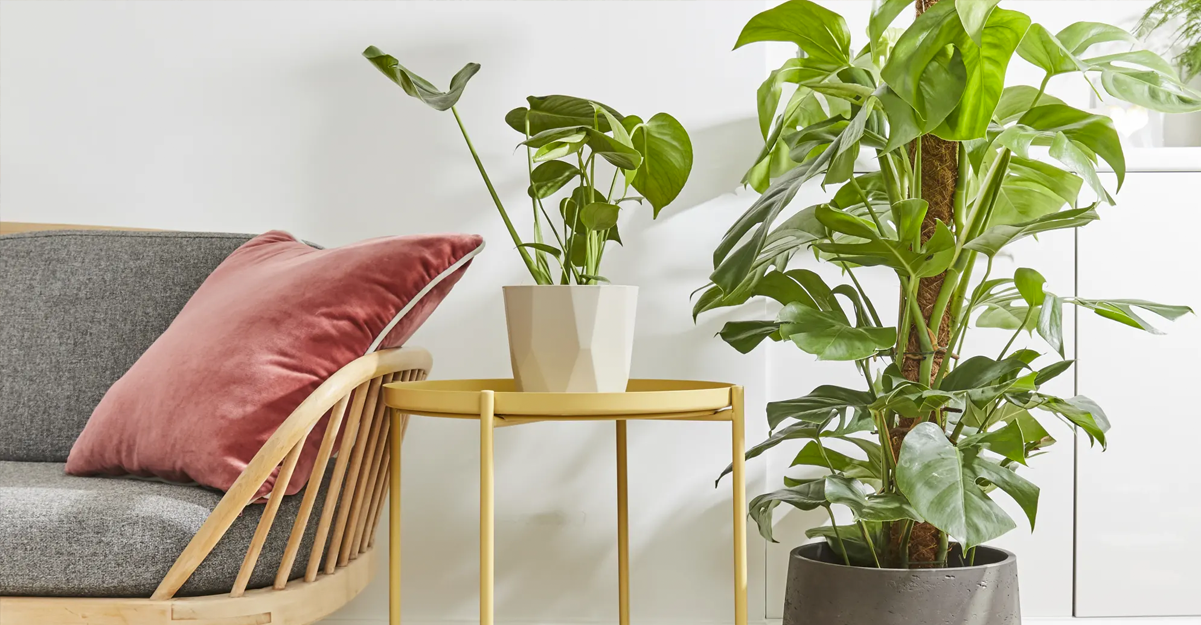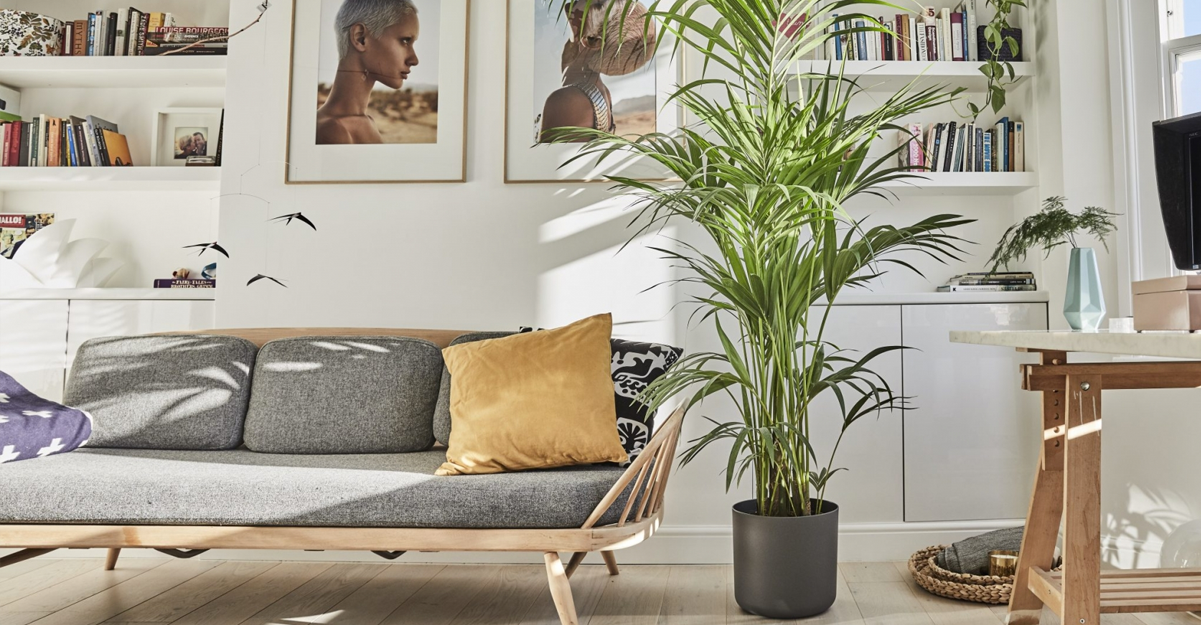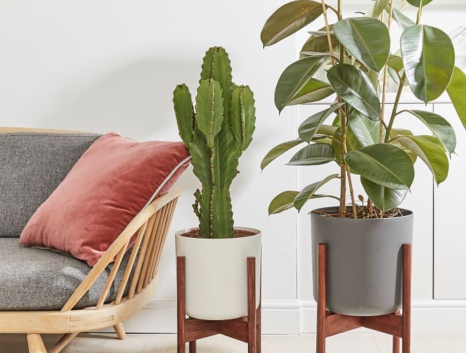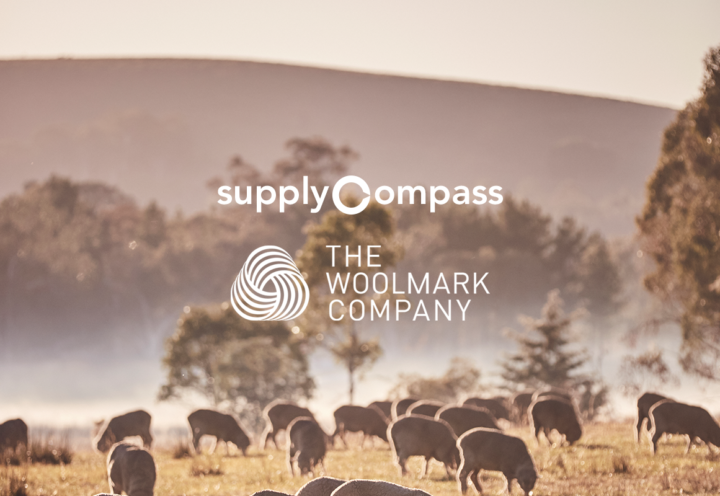In Conversation With Franky and Emily from Patch
8 min
All photography provided by Patch
SupplyCompass recently spoke to Emily, Retail Lead, and Franky, Head of Marketing, from Patch – a British online plant store helping grey cities become greener by delivering a range of plants straight to your door. From their start in 2015, they are now operating UK-wide and have ambitious expansion plans across mainland Europe. We sit down with Patch and discuss their supply chain, what they are doing to become a more sustainable business, and what’s in store for the future.
In Conversation With is SupplyCompass’ latest interview series, highlighting fashion and homeware brands from around the globe who are balancing people, profit and planet, and are leading the way when it comes to responsible business.
Tell us about Patch and what makes it unique?
Patch is an online plant shop for modern, urban people. Our mission is to create greener, not greyer cities. We have been around for four years – in fact, our birthday was last week! As a business, we want to work to remove barriers for people living with more plants. We think that those who need it most are city dwellers, as there are the least amount of plants around people in cities.
The barriers we see are that most people love plants but they think that they’re hard work. There’s also a barrier to access, as many people don’t know where to buy plants. There are fewer and fewer garden centres around, and not many people have a car.
There’s also a barrier around knowledge; not knowing which plants to pick and how to keep them alive. Our website is built to make it easy for anyone without any experience to pick the right plants for their space, and help them look after them. We have developed two online courses, and we also launched a plant doctor service that will help our customers try to save sick plants.

Who is the typical Patch customer?
Our customer base is split across two segments: people buying for their homes, and people buying for their businesses. The split is around 75% homes, and 25% businesses. Until two months ago we were only in London and Paris, but now we’re servicing nationwide in the UK.
Our home segment in London mainly targets online shoppers, usually a younger demographic. They are usually renting and they are keen for an easy and affordable way to make their home a nice place to chill out. They’re also looking for a hobby, and something they can do with their hands, and something they can learn more about. They’re often aiming to create a more relaxing environment, not just a better looking one, as plants can help bring a relaxing atmosphere to a space.
Where are you currently operating?
All of our plants are grown in Holland – it’s the European capital of plants. The vast majority of plants that are sold anywhere in Europe are grown in Holland and are then transported by land to the UK. Interestingly, the distance between our distribution centre in Holland and London is a lot smaller than the distance between London and some other parts of the UK.
When we test-launched in Paris a year ago, we learned that it wasn’t a big addressable market, but it was a good step for us to take in terms of learning how to operate in a new market and building a supply chain that could help us service the whole of Europe as easily as we do in the UK. For the next year, we are focussed on scaling across the UK as there are plenty of growth opportunities for us here.

What does sustainability mean to Patch, and how is this intertwined with how the business operates?
I have to be transparent and say that sustainability was not a founding principle of the business, as for the first two years we were trying to survive. Now we are at the stage where it’s exciting for all of us and it’s something we have wanted to do for a long time, so we can prioritise it.
We are currently going through the process of applying to become a B Corp, and we see this as a really great framework for assessing where our biggest areas for improvement are and highlighting what we can do to maximise our sustainable impact.
In terms of our business model, the way we sell and deliver plants is different and more sustainable from how others do it. Most plants are bought in shops, garden centres, in places like B&Q and IKEA. Those plants are typically grown in Holland, transported to a distribution centre, and then they are sent to a garden center or retailer and they can spend varying amounts of time there. Those that are sold are then typically driven home by a customer that has also had to drive to the store. Quite a lot of them are potentially thrown away, as they would have to buy stock, and they try and sell through as much stock as possible, but the forecasting is never that perfect and there is wastage in that process.
Alternatively, the supply chain for our plants is a just-in-time, direct-to-consumer model. We only buy the plants from our growers after we’ve sold them – that means we have almost zero wastage, as we only take from the grower what we’ve sold. There’s a small amount of wastage for things that get damaged in transit or returned, but it’s tiny, especially compared to the retailer model. Secondly, our transport is cut down significantly as the plants go directly from growers to our London warehouse, and then to people’s homes. As we own this supply chain process, we can optimise it. We have focused a lot on the amount of ‘air’ that we ship, so by doing things like putting shelves in our vans and by using different trolleys and ways of racking, making it a lot more efficient.
Another element is our packaging – we deliver all of our London plants with no extra packaging or boxes, which our customers have responded really positively to. The only way we are able to scale and insert it into a nation-wide courier service is if the plant is in a box. We have worked with our box supplier to make this as sustainable as possible, considering reusability and recyclability. In terms of our products, we also launched a range of wooden plant stands made with sustainably sourced wood, which we worked with SupplyCompass to produce.

In terms of sustainability, we also know it’s important to a lot of our customers based on the huge amount of feedback and research we receive, and that they would prefer to buy for a business that’s responsible and sustainable.
How do you manage your supply chain?
We have quite a number of suppliers – our approach is quite different for each product category as the supply chain is different. We work with around 30-40 growers directly in Holland and we always look for suppliers that are focused on the same things that we are focused on. For example, we look for growers that are doing the right thing by the environment or using as little chemicals as possible. Our warehouse is in Holland as a lot of our supply base is European, but not necessarily within the UK. For example, we get pots and plant accessories from suppliers in Antwerp and Holland, and we also have production in India, Vietnam, China and Portugal – so it’s spread out around the globe.
We always try and look for suppliers that are akin to our brand, so we’re working together and growing together – SupplyCompass is a great example of this. Ideally, we look for smaller players rather than massive producers, and those that have big ambitions that we can partner with.
We have also found that we are quickly becoming too big for some of our suppliers to easily manage – for example, a couple of years ago we were buying pretty small quantities from branded suppliers that had stock. Now they are having to order the stock on our behalf, and full containers are being delivered on a weekly basis. It’s much more focused on long-term planning to make sure we have availability.
In light of the current COVID-19 pandemic, how has Patch adapted?
Our sales have increased dramatically – they are roughly 500% up from this time last month. Stock that previously would have lasted us twelve weeks is now only going to last us a couple of weeks. It’s been a big task for our production team to figure out how to fill stopgaps.
In terms of our supply chain, due to COVID, we can’t get production for some of our products when we need it. For a small team in production, it’s a challenge because to try and resource that production from somewhere else will take just as long, so it’s not really an option to try and find a lot of different solutions in the meantime. We have lots of stopgaps and it’s very difficult to forecast, as it’s hard to know whether this is the new “normal” for us. We don’t really know what our “normal” is going to be after this period – forecasting four months ahead is incredibly difficult.
Some of our supply chain is affected by factory closures, but our growers are mostly running smoothly, which is important as plants equate to two-thirds of our sales. The other third are pots and accessories, and this is where there are delays due to closures and restrictions. We’re working really closely with our suppliers – in fact, I’ve never been on the phone as much to suppliers as I have over the last four weeks, it’s now a daily occurrence.
It’s been great to build such strong relationships with all of our suppliers during this difficult time, and support the industry by keeping demand in the supply chain. What has been really nice in this whole situation has been able to support our growers, especially as they are often small, family-run businesses and it’s a very difficult time for them. There is very little plant business online – the vast majority is offline, so retail brick-and-mortar stores who have cancelled or paused orders are deeply affecting growers. Plus, their “Christmas” or peak sales period is now, so they spend the whole year preparing for Easter/spring. They have invested a huge amount of time and money for this period and now their sales are down by 80%. It’s been really great to support them – we even had a grower send a cake to our warehouse as a thank you.
We find it very easy to work with businesses that are similar to us – young and ambitious. Without SupplyCompass, we couldn’t manage all the production on our own, as we don’t have the resources to travel, connect with factories in India, and compare production. To be able to access the SupplyCompass network is what we need at this stage of our business.
What advice would you give to other brands that aren’t embracing sustainability just yet?
It’s important to focus on it at the right time. The reason we have started to think about sustainability much more seriously is twofold; firstly, our people are our most important asset and we all want to work for a responsible business. Secondly, we have just got to the scale where we can afford to do some things that eat into short term growth or margins without putting the future survival of the business at too much risk. For venture-backed startups like us, we first need to survive the first few years to be able to have any lasting positive impact on our customers, team or the environment.

Highlighting fashion and homeware brands from around the globe who are balancing people, profit and planet.
Margo is a global marketing manager with a focus on fashion, sustainability, innovation and partnerships. She has experience spanning across startup, agency, and client-side environments globally across Australia, Europe and Asia, and thrives working with diverse and dynamic teams to make a difference. She has lived and studied across Australia, Canada, Finland, Denmark, Chile, Germany and the UK and is a World Economic Forum Global Shaper in the Frankfurt, Germany hub.
More on our blog
In Conversation With Queen of Raw: Webinar Recap
We recently hosted a webinar with Stephanie Benedetto, Co-Founder of Queen of Raw, an NYC-based technology company with a marketplace solution that matches fashion organizations looking to offload excess fabrics with buyers interested in high quality sustainable and affordable textiles.
5 min read
SupplyCompass Partners with The Woolmark Company to Launch Wool Supply Chains and Guide
We’re thrilled to announce our partnership with The Woolmark Company, the global authority on wool. Together, we are setting up trusted wool supply chains through a phased roll-out, as well as launching a wool guide to help brands launch new categories of wool products.
The Latest Innovations in Wool
Think you know wool? Think again. These innovative product developments will change the way you work with wool. From innovations reducing the impact of end products, to driving the adoption of cleaner process and technologies within the supply chain, this is Merino wool, but not as you know it.
6 mins
Get started with our platform
Let’s stay
in touch!
Everything you need to know about sustainable supply chains, including industry news and product updates, delivered straight to your inbox.



